朗文4A Chapter 4复习提要
香港朗文4a各单元总结
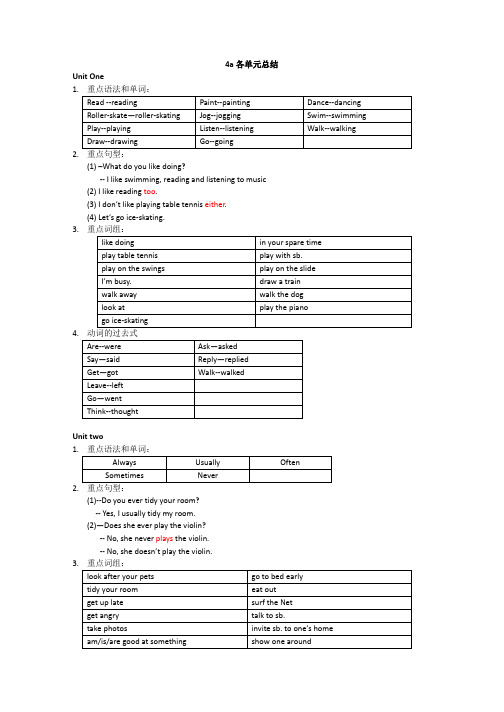
4a各单元总结Unit One1.2.重点句型:(1) –What do you like doing?-- I like swimming, reading and listening to music(2) I like reading too.(3) I don’t like playing table tennis either.(4) Let’s go ice-skating.3.4.Unit two1.2.重点句型:(1)--Do you ever tidy your room?-- Yes, I usually tidy my room.(2)—Does she ever play the violin?-- No, she never plays the violin.-- No, she doesn’t play the violin.3.4.Unit Three1.2.3.重点句型:(1)--Was there any cola when you were young?-Yes, there was.(2)The game I like best was marbles.(3)How do you play marbles?(4)– Did you wear trainers fifty years ago?--Yes, I did.(5)—Did you have a telephone?-- No, I didn’t. Rich people had telephones at home but poor people didn’t.(6 ) – Did you shop at the supermarket?--- No, I didn’t. There weren’t any supermarkets.(7) – Did you go to school?-- No, I didn’t. Rich children go to school but poor children didn’t.(8) –Did you listen to the radio?-- Yes, I did.Where(哪里)do you like going to in your holiday?How(如何)do you help at home?How much (多少钱,提问不行数名词)is it? --- It is five dollars. How many (多少,提问可数名词)books in your home?What time(什么时间)is it?What(什么)are you doing now? ----I am doing my homework. What(什么)is the weather like today? ----It’s windy.What color (什么颜色)is it? ---- It is red.What (什么)are you? ( What do you do?) -----I am a driver.When(什么时候)is your birthday? ---on 2nd MayHow old(多大)are you? ----I am ten.Who (谁) are you? -----I am David.Which(哪一个) club do you want to join?Why(为什么)do you like playing football?----Because I like being healthy.。
香港朗文版4A-Chapter4-Five-hundred-years-ago

22 rice and meat
Were there any tunnels 500 years ago?
a tunnel
a rope bridge
23
Were there any long bridges
500 years ago?
long bridge
short bridge
24
大部分人: most people 一些人: Some people 少部分人: a few people 几乎没人: few people 没人: no people no one
ed-id
need-needed
ed-id
ed的三种发音: 清读清(t), 浊读浊(d) t,d 结尾读 id
30
No, there weren’t.
How was life 500 years ago? Were there any supermarkets?
31
No, they didn’t.
Five hundred years ago
1
About 500 years ago the year 1513 Ming dynasty
Zhu yuan zhang
The emperor of Ming dynasty
2
People
• 士 scholar • 农 farmer • 工 worker • 商 businessman
25
Part E
26
27
People didn't .... There was/ were... There wasn't/ weren't...
28
词尾-ed 的发音 ask-asked bake-baked cook-cooked drop-dropped finish-finished help-helped like-liked look-looked surf-surfed
香港朗文4a各单元总结
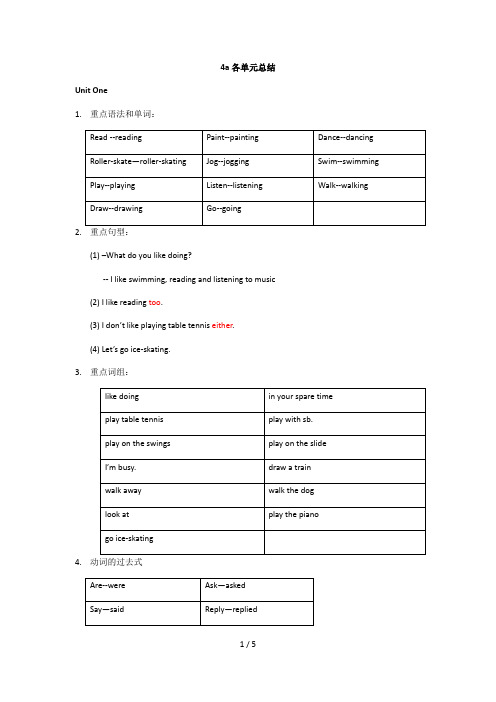
4a各单元总结Unit One1.重点语法和单词:2.重点句型:(1) –What do you like doing?-- I like swimming, reading and listening to music(2) I like reading too.(3) I don’t like playing table tennis either.(4) Let’s go ice-skating.3.重点词组:4.动词的过去式Unit two1.重点语法和单词:2.重点句型:(1)--Do you ever tidy your room?-- Yes, I usually tidy my room.(2)—Does she ever play the violin?-- No, she never plays the violin.-- No, she doesn’t play the violin.3.重点词组:4.动词的过去式Unit Three1.重点语法:2.重点单词和词组:3.重点句型:(1)--Was there any cola when you were young?-Yes, there was.(2)The game I like best was marbles.(3)How do you play marbles?(4)– Did you wear trainers fifty years ago?--Yes, I did.(5)—Did you have a telephone?-- No, I didn’t. Rich people had telephones at home but poor people didn’t.(6 ) – Did you shop at the supermarket?--- No, I didn’t. There weren’t any supermarkets.(7) – Did you go to school?-- No, I didn’t. Rich children go to school but poor children didn’t.(8) –Did you listen to the radio?-- Yes, I did.Where(哪里)do you like going to in your holiday?How(如何)do you help at home?How much (多少钱,提问不可数名词)is it? --- It is five dollars. How many (多少,提问可数名词)books in your home?What time(什么时间)is it?What(什么)are you doing now? ----I am doing my homework. What(什么)is the weather like today? ----It’s windy.What color (什么颜色)is it? ---- It is red.What (什么)are you? ( What do you do?) -----I am a driver.When(什么时候)is your birthday? ---on 2nd MayHow old(多大)are you? ----I am ten.Who (谁) are you? -----I am David.Which(哪一个) club do you want to join?Why(为什么)do you like playing football?----Because I like being healthy.。
香港朗文4a各单元总结汇编

4a各单元总结Unit One1.重点语法和单词:2.重点句型:(1) –What do you like doing?-- I like swimming, reading and listening to music(2) I like reading too.(3) I don’t like playing table tennis either.(4) Let’s go ice-skating.3.重点词组:4.动词的过去式Unit two1.重点语法和单词:2.重点句型:(1)--Do you ever tidy your room?-- Yes, I usually tidy my room.(2)—Does she ever play the violin?-- No, she never plays the violin.-- No, she doesn’t play the violin.3.重点词组:4.动词的过去式Unit Three1.重点语法:2.重点单词和词组:3.重点句型:(1)--Was there any cola when you were young?-Yes, there was.(2)The game I like best was marbles.(3)How do you play marbles?(4)– Did you wear trainers fifty years ago?--Yes, I did.(5)—Did you have a telephone?-- No, I didn’t. Rich people had telephones at home but poor people didn’t. (6 ) – Did you shop at the supermarket?--- No, I didn’t. There weren’t any supermarkets.(7) – Did you go to school?-- No, I didn’t. Rich children go to school but poor children didn’t.(8) –Did you listen to the radio?-- Yes, I did.Where(哪里)do you like going to in your holiday?How(如何)do you help at home?How much (多少钱,提问不可数名词)is it? --- It is five dollars. How many (多少,提问可数名词)books in your home?What time(什么时间)is it?What(什么)are you doing now? ----I am doing my homework. What(什么)is the weather like today? ----It’s windy.What color (什么颜色)is it? ---- It is red.What (什么)are you? ( What do you do?) -----I am a driver.When(什么时候)is your birthday? ---on 2nd MayHow old(多大)are you? ----I am ten.Who (谁) are you? -----I am David.Which(哪一个) club do you want to join?Why(为什么)do you like playing football?----Because I like being healthy.。
(完整版)香港朗文4a各单元总结
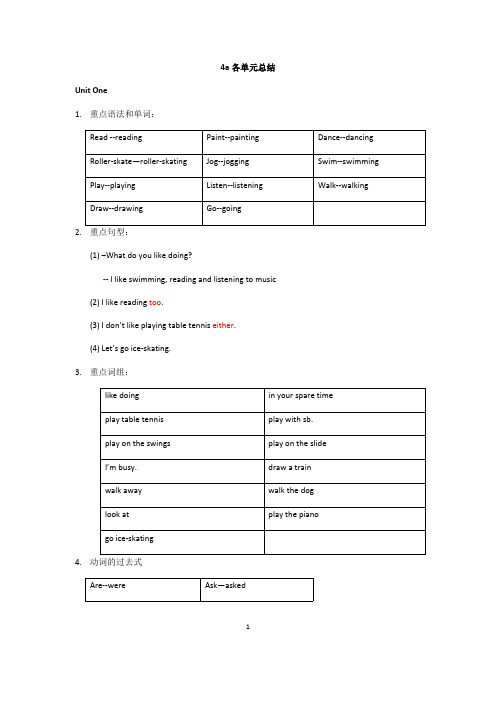
4a各单元总结Unit One1.重点语法和单词:Read --reading Paint--painting Dance--dancing Roller-skate—roller-skating Jog--jogging Swim--swimming Play--playing Listen--listening Walk--walking Draw--drawing Go--going2.重点句型:(1) –What do you like doing?-- I like swimming, reading and listening to music(2) I like reading too.(3) I don’t like playing table tennis either.(4) Let’s go ice-skating.3.重点词组:like doing in your spare timeplay table tennis play with sb.play on the swings play on the slideI’m busy.draw a trainwalk away walk the doglook at play the pianogo ice-skating4.动词的过去式Are--were Ask—asked1Say—said Reply—repliedGet—got Walk--walkedLeave--leftGo—wentThink--thoughtUnit two1.重点语法和单词:Always Usually OftenSometimes Never2.重点句型:(1)--Do you ever tidy your room?-- Yes, I usually tidy my room.(2)—Does she ever play the violin?-- No, she never plays the violin.-- No, she doesn’t play the violin.3.重点词组:look after your pets go to bed earlytidy your room eat outget up late surf the Netget angry talk to sb.take photos invite sb. to one’s home am/is/are good at something show one around2look around go into the dining roomenjoy the meal play a lot of musicplay the recorder play the pianoplay the violin play a lot of sportplay pingpong play table tennisplay football watch football matches4.动词的过去式say—said talk—talkedcan—could ask--askedthink—thought show--showedhave—had call—calledwill--would enjoy--enjoyedspill—spilled/spilttake--tookgo--wentUnit Three1.重点语法:am/is/are--was are--were ask--asked like--likedfly--flew make--made flick--flicked want--wanted catch--caught draw—drew stay--stayed happen--happened put--put say--said Play--playedhave/has--had hit--hit3keep--kept go--wentlose--lost do--didwin--won2.重点单词和词组:cola fast food CDscomics clocks air-consmobile-phones rickshaw an oil lampclogs camera fanstove play computer games fly kitesplay hopscotch make nets catch butterflies play marbles draw a circle on the groundgo out of the circle want to +动词原形flick the shooter into thecirclego out a lot of credit cardswear trainers have telephones check your answer ask someone3.重点句型:(1)--Was there any cola when you were young?-Yes, there was.(2) The game I like best was marbles.(3) How do you play marbles?(4)– Did you wear trainers fifty years ago?--Yes, I did.(5)—Did you have a telephone?4-- No, I didn’t. Rich people had telephones at home but poor people didn’t. (6 ) – Did you shop at the supermarket?--- No, I didn’t. There weren’t any supermarkets.(7) – Did you go to school?-- No, I didn’t. Rich children go to school but poor children didn’t.(8) –Did you listen to the radio?-- Yes, I did.Where(哪里)do you like going to in your holiday?How(如何)do you help at home?How much (多少钱,提问不可数名词)is it? --- It is five dollars. How many (多少,提问可数名词)books in your home?What time(什么时间)is it?What(什么)are you doing now? ----I am doing my homework. What(什么)is the weather like today? ----It’s windy.What color (什么颜色)is it? ---- It is red.What (什么)are you? ( What do you do?) -----I am a driver.When(什么时候)is your birthday? ---on 2nd MayHow old(多大)are you? ----I am ten.Who (谁) are you? -----I am David.Which(哪一个) club do you want to join?5Why(为什么)do you like playing football?----Because I like being healthy.6。
朗文4A-Chapter-4复习提要

《朗文英语4A》复习提要Chapter 4:Five hundred years ago五百年之前I. 经过第4章的学习,下面的新单词我们要准确无误地读(read them correctly),知道它们的中文意思(know the Chinese meaning),不看书进行英汉互译( translate),并且还要会拼写( spell)。
cotton clothes棉质衣服silk clothes丝绸衣服a horse一匹马a sedan chair一台轿子silver and gold银子和金子paper money纸币a village 一个村子a town一个镇子II.句型。
下面的关键句型我们要会读(read), 知道意思(know the Chinese meaning),会根据不同的语境来运用(use them in different contexts),会写(write them correctly)。
1. --What did people wear 500 years ago?-- Most people wore cotton clothes.Some people wore silk clothes--五百年前人们穿什么?--大部分人穿棉质衣服。
一些人穿丝绸衣服。
2. -- How did people travel 500 years ago?--Most people walked or rode horses.Rich people travelled by sedan chairSome people travelled by boat.-- 五百年前人们怎么旅行?--大部分人步行或骑马去旅行。
富人坐轿子旅行。
一些人坐船旅行。
3.-- How did people pay for things 500 years ago? Or we can say:How did people pay 500 years ago?--Most people paid for things with silver and gold.Or we can say: Most people paid with silver and gold. --Some people paid for things with paper money.Or we can say: Some people paid with paper money. --五百年前人们怎么买东西?--大部分人用银子和金子买东西。
最新香港朗文4A各单元知识要点 词汇语法
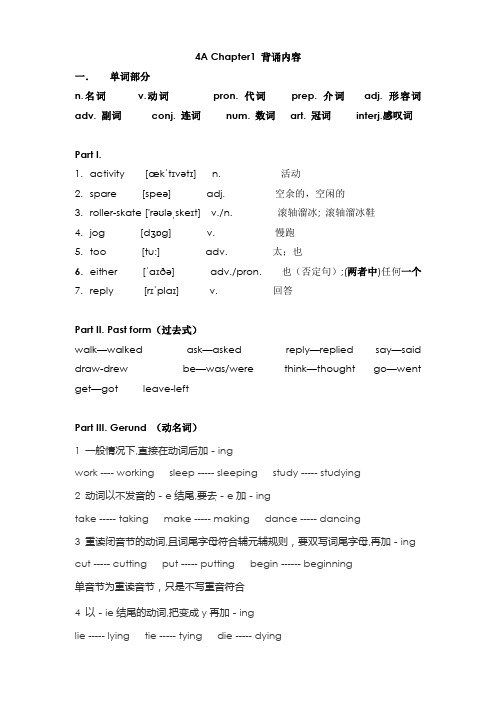
4A Chapter1 背诵内容一.单词部分n.名词v.动词pron. 代词prep. 介词adj. 形容词adv. 副词conj. 连词num. 数词art. 冠词interj.感叹词Part I.1.activity [ækˈtɪvətɪ] n. 活动2.spare [speə] adj. 空余的,空闲的3.roller-skate ['rəʊləˌskeɪt] v./n. 滚轴溜冰; 滚轴溜冰鞋4.jog [dʒɒg] v. 慢跑5.too [tu:] adv. 太;也6.either [ˈaɪðə] adv./pron. 也(否定句);(两者中)任何一个7.reply [rɪˈplaɪ] v. 回答Part II. Past form(过去式)walk—walked ask—asked reply—replied say—said draw-drew be—was/were think—thought go—went get—got leave-leftPart III. Gerund (动名词)1 一般情况下,直接在动词后加-ingwork ---- working sleep ----- sleeping study ----- studying2 动词以不发音的-e结尾,要去-e加-ingtake ----- taking make ----- making dance ----- dancing3 重读闭音节的动词,且词尾字母符合辅元辅规则,要双写词尾字母,再加-ing cut ----- cutting put ----- putting begin ------ beginning单音节为重读音节,只是不写重音符合4 以-ie结尾的动词,把变成y再加-inglie ----- lying tie ----- tying die ----- dying二.词组部分1.i n one’s spare time在某人的空余时间2.listen to (the) music 听音乐3.play chess 下棋4.like/love/enjoy doing 喜欢干某事5.go swimming (去)游泳6.go jogging (去)慢跑7.go roller-skating (去)溜冰8.be good at sth./doing 擅长于某事/干某事9.be poor at sth./doing 不擅长于某事/干某事10.be interested in sth./doing 对干某事/干某事感兴趣11.be afraid of sth./doing 害怕某事/干某事12.at/on the weekend 在周末at/on weekends13.on weekdays 在工作日14.be busy with sth. 忙于某事15.be busy doing 忙于干某事16.enjoy oneself= have a good time 某人玩得很开心17.a family helper 一位家庭帮手18.pick up kids 接小孩19.play the piano/violin 弹钢琴,拉小提琴(西洋乐器名词前加the )20.play Erhu 拉二胡(民族乐器前无the)21.play table tennis 打羽毛球(球类名词前无the)22.play on the swing/slide 在秋千(滑滑梯)上玩23.play with sb. 与某人一起玩24.play with sth. 玩耍某物25.a bit later 一会儿以后26.walk away sadly 难过地走开了27.walk the dog 溜狗28.walk home=go home on foot 走回家29.go home =go back home 回家30.after that 在那以后31.the black notes (钢琴上)黑键32.see sb. doing 看到某人在干某事33.make a new friend named Tom 交了一个叫汤姆的朋友34.in fact = actually/ˈæktʃʊəlɪ/事实上35.in the gym 在体育馆36.indoor stadium /'steɪdɪəm/ 室内体育馆37.finish sth./doing sth. 完成某事/干某事38.be important to sb. 对某人而言是重要的(绿色字体部分为拓展内容,供学有余力的小朋友默写。
最新香港朗文4A各单元知识要点词汇语法

最新香港朗文4A各单元知识要点词汇语法以下是最新版香港朗文4A各单元的词汇和语法要点:Unit 1: Going Places- 词汇:transportation(交通工具),destination(目的地),navigate(导航),explore(探索)- 语法:一般现在时,there is / there are句型,情态动词can的用法Unit 2: Nature's Forces- 词汇:natural disasters(自然灾害),flood(洪水),earthquake(地震),hurricane(飓风),volcano(火山)- 语法:一般过去时,情态动词must / mustn't的用法Unit 3: Materials and Properties- 词汇:materials(材料),properties(特性),solid(固体),liquid(液体),gas(气体)- 语法:现在进行时,情态动词should / shouldn't的用法Unit 4: Diverse Cultures- 词汇:diverse(多样化的),culture(文化),tradition(传统),custom(风俗),celebration(庆祝活动)- 语法:现在完成时,情态动词could / couldn't的用法Unit 5: The Arts- 词汇:artistic(艺术的),creative(创造性的),performance(表演),sculpture(雕塑),painting(绘画)-语法:一般将来时- 语法:过去进行时,情态动词may / must的用法以上是最新香港朗文4A各单元的词汇和语法要点。
请注意,这些要点可能会因版本差异而有所变化,建议参考最新教材或教师的指导。
香港朗文4A Chapter 4 teaching plans

1.Freetalk.(pupilsaskandanswerquestionstheysetout)
Whatdidyoudolastweekend?Didyou…?
Step2:Introduction
Difficulties:
1.IrregularVerbs:wear-worego-wentride-rode.
单元课时分配
4课时
课时1:PartA:Learnthenewphrasesandhowtousepasttensetodescribethinghappenedbefore
课时2:PartA:reviewandpracticetheusingofpasttense
重点难点
UsingthequantitiesandIrregularVerbscorrectly
课时安排
lesson2
教学过程
批注与反思
Step1Warmup
1.ReviewthephraseswithSs.
Playagame:Sharpeyes.Tshowsthecardsquickly,pupilswatchandreaditfast.Whocanreaditfasterwillgetonepoint.(cottonclothes,silkclothes,ahorse,asedanchair……)
重点难点
1.Toconverseaboutfeelings,interests,preferences,ideas,experiencesandplans.
2.Howtoexpressmorewithinpupils’limitedbackknowledge.
课时安排
Lesson3
香港朗文英语4a语法 综合复习4

综合复习4(比较级和最高级以及人称)一.复习巩固1.Are there two ( box ) on the table?2.I can see some ( people ) in the cinema.3.How many ( day ) are there in a week?4.Each people have more than 28 (tooth) and two (foot).5.This ( violin ) is hers. Those ( grape ) are over there.6. (that) are some flowers and (this) are some apples.7.Tom usually (go) to school by bus.8.Grady and Cherry often (read) newspapers at home.9.It takes me half (a/an) hour to go there.10.Look. They (dance) now. Listen, Lily (sing) now.二.人称代词复习1.That is not ______ kite. That kite is very small, but ____ is very big. ( I )2. The dress is _________. Give it to _________. ( she )3.Is this _________ watch? ( you ) No, it’s not _________ . ( I )4.____ is my brother. ___ name is Jack. Look! Those stamps are __. ( he )5._________ dresses are red. ( we ) What colour are _________? ( you )三.比较级和最高级的复习1. Things are getting _______ and _______. (bad)2. The higher you climb, the _______ it will be. (cold)3. Now his life is becoming ________ and _______. (difficult)4. There are _______ boys than girls in our class. (few)5. The population of Shandong is_____ than that Sichuan.(little)6.Which is __________ (big) ,the sun, the moon or the earth?17.Which is ______________ (beautiful),the black coat or the blue one? 19.This moon cake is ___ ________ (cheap) of all.8.He is __________ (strong) in the class.9.Sue is a little ___________ (beautiful) than her sister.10.My room is not as _________ (big) as my brother' s.四.阅读理解Peter is four years old. He is lovely. His father and mother love him very much. His mother often feeds food to him and carries him in her arms. Peter is too spoiled(宠坏).It is Sunday. His father wants to take him to the park. Little Peter is asking his father to carry him. His father says,“Peter, you have feet. You can walk yourself.“But mum always holds me in her arms,” say Peter unhappily.“Why do you have feet?”“When I am not happy, I kick my mother with them,” says Peter happily.( ) 1.Peter is a ______ child.A.friendlyB.smallC.lovelyD.English( ) 2.Peter’s _____ spoi ls him very much.A.motherB.fatherC.parentsD.people( ) 3.Peter’s father ______ on this Sunday.A.is teaching him to walkB.is taking him to playC.is taking to himD.is carrying him to the park( )4.Peter ___.A.doesn’t have feetB.doesn’t want to walkC.can not walkD.doesn’t want to go( )5.Peter kicks his mother when he is ________.A.happyB.walkingC.spoiledD.unhappy五.请用不少于10句话写出阅读绘本的心得或者复述故事。
最新香港朗文英语4A第四单元知识要点 词汇语法

4A Chapter 4 背诵内容I. 音标和单词:1.hundred ['hʌndrəd] num. 一百thousand ['θaʊznd] num. 一千2.cotton ['kɒtn] n. 棉;棉布;棉织物3.silk [sɪlk] n. 丝绸;(蚕)丝;丝织物;(用于缝纫的)丝线4.horse [hɔːs] n. 马5.sedan chair [sɪ'dæn tʃeə] n. 轿子6.silver ['sɪlvə] n. 银;银色;白银,银子7.coin[kɔɪn] n. 硬币; 金属货币;8.gold [ɡəʊld]n. 金,金色,金黄色;黄金9.paper money ['peɪpə 'mʌnɪ] n. 纸币;票子;钱票10.village ['vɪlɪdʒ] n. 村庄;乡村11.town [t aʊn] n. 小镇;城镇12.content(s) ['kɒntent] n. 目录13.tunnel ['tʌnl] n. 地下通道;地道;隧道14.bridge [brɪdʒ] n. 桥;桥梁15.airport ['eəpɔːt] n. 机场16.fridge [frɪdʒ] n. 冰箱17.pigeon ['pɪdʒɪn] n. 鸽子附:Chapter 4动词过去式变化表(详见朗文P62-65总表)do-did go-went wear-wore find-foundtravel-travelled/traveled pay-paid live-livedam/is-was are-were feel-felt try-tried fall-fellwake-woke keep-kept start-startedstop-stopped look-looked say-said take-tookask-asked write-wrote can-could have-had explain-explained miss-missed give-gave want-wanted cook-cooked eat-ate drink-drank buy-bought celebrate-celebrated make-made listen-listenedII. 词组:1.five hundred years ago 五百年前ten thousand years ago 一万年前2.do a history project 做一个历史课题do a history project on life 500 years ago 做一个关于500年生活的的历史课题3.cotton clothes 棉布衣服4.silk clothes 丝绸服装5.find out 查出,发现6.ride a horse/ride horse s骑马7.travel by sedan chair 乘轿子出行8.travel by boat 乘船出行9.most people 大多数人common people 普通人,平民some people 一些人rich people 富人,有钱人10.in villages 在村庄in towns 在城镇11.pay for things 付款(购物)12.contents page 目录页13.free time 空闲时间14.make money 赚钱15.work hard 努力工作;努力学习16.cook with gas 用煤气做饭cook with firewood 用柴火做饭17.eat congee and vegetables 吃粥和蔬菜eat rice and meat 吃米饭和肉18.live in flats 住在公寓里live in simple/large houses 住在简易的房子/大房子里19.celebrate Christmas 过圣诞节celebrate Chinese New Year 过春节20.buy food at supermarkets 在超市买食品buy food at markets 在集市买食品21.life in the past 过去的生活22.dream about … 梦见……23.do one’s homework 做作业24.feel sleepy 感到困倦,发困,昏昏欲睡25.try to do sth. 尽力做某事try one’s best = do one’s best 竭尽全力26.after a while 过了一会儿27.wake up 醒来28.fall asleep 睡着asleep adj. 睡着的(反义词:awake adj. 醒着的)29.keep in touch with sb. 与某人保持联系30.be away from home 离家在外31.start to do sth. 开始做某事32.look out 往外望Look out! 当心!小心!33.ride in a sedan chair 坐轿子34.miss his own family 想家35.send letters 寄信36.by land 陆运by sea 海运by air 空运37.at the door 在门口III. 句型:1.How did they keep in touch with their families when they were awayfrom home? 离家在外的人们是怎么与他们的家人保持联系的?2.Please may I use your phone? 我能借用一下你的电话吗?I want to call my father. 我想要打电话给我爸爸。
4A朗文Chapter 4和5知识点梳理

4A朗文Chapter 4与5知识点梳理【必讲知识点】1、辨析 few,a few, little, a little:few 极少,几乎没有表示“否定”意义接可数名词复数形式a few 少许表示“肯定”意义接可数名词复数形式little 极少,几乎没有表示“否定”意义接不可数名词a little 少许表示“肯定”意义接不可数名称2、 fewer与 less都可以表示“更少”(1) fewer 后接可数名词得复数形式,就是 few得比较级(2) less 后接不可数名词,就是 little得比较级3、辨析 much,many, so much与 so manyso much 如此多接不可数名词so many 如此多接可数名词得复数形式much 许多接不可数名词many 许多接可数名词得复数形式4、 a lot of = lots of 表示许多,后可接可数名词得复数形式以及不可数名词。
5、 stop 用法stop to do 停止去做另外一件事stop doing 停止做某事(指手头得事)6、There be句型得一般过去时1.肯定式there be句型得一般过去时表示过去某地或某时存在某人或某物,其一般过去时态得陈述句由“there+was/were+主语+地点状语+时间状语”构成。
there was后接单数名词;there were后接复数名词。
例如:There was a car under the tree a moment ago、刚才这棵树下有一辆小轿车。
There were two foreign teachers in our school last year、去年我们学校有两名外教。
2.否定式there be句型一般过去时得否定式就是在动词was或were得后面加not,可缩写为wasn’t或weren’t。
例如:There wasn’t a film in the cinema last night、昨晚电影院里没有演电影。
4A Unit4知识点过关纸

4A Unit4 I can play basketball一、课内单词basketball 篮球football 足球jump 跳skate 滑冰swim 游泳run跑步well 好fly 飞ouch 哎呦sad 难过的,伤心的too也either 也breakfast早餐funny有趣的Peter(人名)彼得Lucy (人名)露西quack (鸭子的)呱呱声tweet (小鸟的)叽喳声yeah 是的,对的sports体育运动activity活动judge判断二、课内词组play basketball 打篮球play football 踢足球can jump 会跳can fly 会飞very well非常好play basketball very well打篮球打得很好skate well 滑冰很好swim well 游泳很好run and swim 跑步和游泳what about 怎么样have a try 试一试eleven years old十一岁my name 我的名字look at me看看我five footballs五个足球ten new basketballs十个新篮球five funny boys五个有趣的男孩don’t be sad 不要伤心,别难过★can’t=cannot不能,不会how about怎么样三、课内句子1. Can you play basketball? 你会打篮球吗?Yes, I can.是的,我会。
No, I can’t.不,我不会。
2. I can play football. 我会踢足球。
3. I can’t play basketball. 我不会打篮球。
4. She can skate. 她会滑冰。
5.She can’t swim.她不会游泳。
6. He can run and swim.他会跑步和游泳。
7. He can play basketball very well. 他能打篮球打得非常好。
(完整)香港朗文4a各单元总结笔记,推荐文档

(完整)香港朗文4a各单元总结笔记,推荐文档香港朗文4a各单元总结笔记Unit 1: My Family- Introduces vocabulary related to family members and their descriptions.- Practice forming sentences using possessive pronouns.- Learn to ask and answer questions about family members.Unit 2: My School- Introduces vocabulary related to school subjects and facilities.- Learn to describe school activities and daily routines.- Practice forming sentences using time phrases.Unit 3: My Friends- Introduces vocabulary related to friends and their characteristics.- Learn to describe personalities and physical appearances.Unit 4: My Hobbies- Introduces vocabulary related to hobbies and leisure activities.- Learn to express preferences and interests.- Practice forming sentences using the present continuous tense.Unit 5: My City- Introduces vocabulary related to places in a city.- Practice giving directions and talking about locations.- Learn to use prepositions of place.Unit 6: My Country- Introduces vocabulary related to countries, nationalities, and cultures.- Learn to talk about countries' landscapes and traditions.- Practice using adjectives to describe places.Unit 7: My Holidays- Introduces vocabulary related to holidays and celebrations.- Learn to describe past experiences and talk about future plans.- Practice using past simple and future tenses.Unit 8: My Future- Introduces vocabulary related to dream jobs and future aspirations.- Learn to express hopes and ambitions.- Practice forming sentences using modal verbs.这个文档总结了香港朗文4a课程的各个单元内容,包括所学词汇、语法和句型。
最新4A朗文Chapter-4和5知识点梳理资料
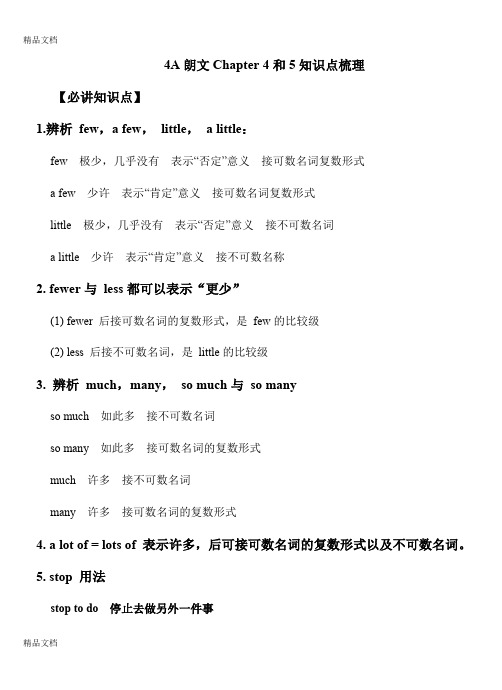
4A朗文Chapter 4和5知识点梳理【必讲知识点】1.辨析few,a few,little,a little:few 极少,几乎没有表示“否定”意义接可数名词复数形式a few 少许表示“肯定”意义接可数名词复数形式little 极少,几乎没有表示“否定”意义接不可数名词a little 少许表示“肯定”意义接不可数名称2. fewer与less都可以表示“更少”(1) fewer 后接可数名词的复数形式,是few的比较级(2) less 后接不可数名词,是little的比较级3. 辨析much,many,so much与so manyso much 如此多接不可数名词so many 如此多接可数名词的复数形式much 许多接不可数名词many 许多接可数名词的复数形式4. a lot of = lots of 表示许多,后可接可数名词的复数形式以及不可数名词。
5. stop 用法stop to do 停止去做另外一件事stop doing 停止做某事(指手头的事)6.There be句型的一般过去时1.肯定式there be句型的一般过去时表示过去某地或某时存在某人或某物,其一般过去时态的陈述句由“there+was/were+主语+地点状语+时间状语”构成。
there was后接单数名词;there were后接复数名词。
例如:There was a car under the tree a moment ago. 刚才这棵树下有一辆小轿车。
There were two foreign teachers in our school last year. 去年我们学校有两名外教。
2.否定式there be句型一般过去时的否定式是在动词was或were的后面加not,可缩写为wasn’t或weren’t。
例如:There wasn’t a film in the cinema last night. 昨晚电影院里没有演电影。
最新4A朗文Chapter-4和5知识点梳理资料
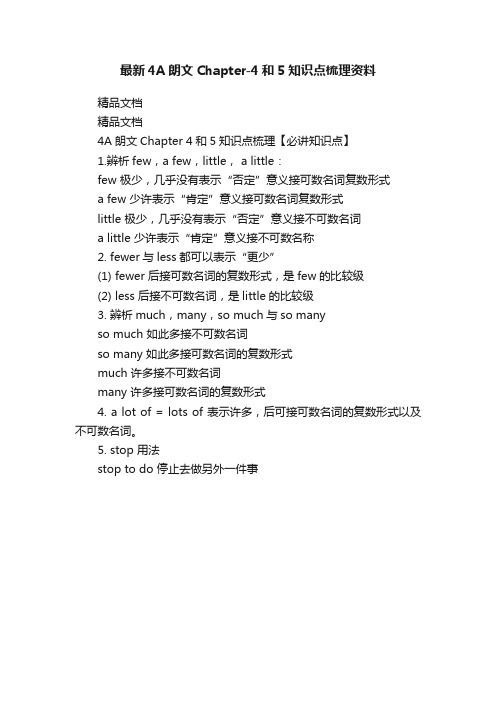
最新4A朗文Chapter-4和5知识点梳理资料
精品文档
精品文档
4A朗文Chapter 4和5知识点梳理【必讲知识点】
1.辨析few,a few,little, a little:
few 极少,几乎没有表示“否定”意义接可数名词复数形式
a few 少许表示“肯定”意义接可数名词复数形式
little 极少,几乎没有表示“否定”意义接不可数名词
a little 少许表示“肯定”意义接不可数名称
2. fewer与less都可以表示“更少”
(1) fewer 后接可数名词的复数形式,是few的比较级
(2) less 后接不可数名词,是little的比较级
3. 辨析much,many,so much与so many
so much 如此多接不可数名词
so many 如此多接可数名词的复数形式
much 许多接不可数名词
many 许多接可数名词的复数形式
4. a lot of = lots of 表示许多,后可接可数名词的复数形式以及不可数名词。
5. stop 用法
stop to do 停止去做另外一件事。
香港朗文4a各单元总结教学提纲

香港朗文4a各单元总结4a各单元总结Unit One1.重点语法和单词:2.重点句型:(1) –What do you like doing?-- I like swimming, reading and listening to music(2) I like reading too.(3) I don’t like playing table tennis either.(4) Let’s go ice-skating.3.重点词组:4.动词的过去式Unit two1.重点语法和单词:2.重点句型:(1)--Do you ever tidy your room?-- Yes, I usually tidy my room.(2)—Does she ever play the violin?-- No, she never plays the violin.-- No, she doesn’t play the violin.3.重点词组:4.动词的过去式Unit Three1.重点语法:2.重点单词和词组:3.重点句型:(1)--Was there any cola when you were young?-Yes, there was.(2) The game I like best was marbles.(3) How do you play marbles?(4)– Did you wear trainers fifty years ago?--Yes, I did.(5)—Did you have a telephone?-- No, I didn’t. Rich people had telephones at home but poor people didn’t.(6 ) – Did you shop at the supermarket?--- No, I didn’t. There weren’t any supermarkets.(7) – Did you go to school?-- No, I didn’t. Rich children go to school but poor children didn’t.(8) –Did you listen to the radio?-- Yes, I did.Where(哪里)do you like going to in your holiday?How(如何)do you help at home?How much (多少钱,提问不可数名词)is it? --- It is five dollars. How many (多少,提问可数名词)books in your home?What time(什么时间) is it?What(什么)are you doing now? ----I am doing my homework.What(什么) is the weather like today? ----It’s windy.What color (什么颜色)is it? ---- It is red.What (什么)are you? ( What do you do?) -----I am a driver.When(什么时候)is your birthday? ---on 2nd MayHow old(多大)are you? ----I am ten.Who (谁) are you? -----I am David.Which(哪一个) club do you want to join?Why(为什么)do you like playing football?----Because I like being healthy.。
朗文英语4A 重点单词句型

Sentences:What do you like doing in your spare time? What do you like doing when you’re free?I like roller-skating, painting and reading. She doesn’t like reading or singing.They can play chess.你业余时间喜欢做什么?你业余时间喜欢做什么?我喜欢溜冰、绘画和阅读。
她不喜欢读书或唱歌。
他们可以下棋。
Sentences:Do you ever tidy your room? Yes, I usually tidy my room. Does he ever surfer the Net? No, he never surfs the Net.This is my best friend, Ken.He likes playing sport.He plays a lot of sport every week. 你曾经整理你的房间吗?是的,我通常整理房间。
他曾经上网吗?不,他从不上网。
这是我最好的朋友,肯。
他喜欢运动。
他每周运动一次。
Sentences:Was there any fast food when you were young, Grandma? Yes, there was.No, there wasn’t.Were there any comics when you were young, Grandpa?Yes, there were.No, there weren’t.Did you were trainers fifty years ago?Yes, I did.No, I didn’t. Rich people had telephones at home but poor people didn’t.当你(您)年轻时有什么快餐,奶奶?是的,有。
- 1、下载文档前请自行甄别文档内容的完整性,平台不提供额外的编辑、内容补充、找答案等附加服务。
- 2、"仅部分预览"的文档,不可在线预览部分如存在完整性等问题,可反馈申请退款(可完整预览的文档不适用该条件!)。
- 3、如文档侵犯您的权益,请联系客服反馈,我们会尽快为您处理(人工客服工作时间:9:00-18:30)。
《朗文英语4A》复习提要Chapter 4: Five hundred years ago 五百年之前I、经过第4章得学习,下面得新单词我们要准确无误地读(read them correctly),知道它们得中文意思(know the Chinese meaning),不瞧书进行英汉互译( translate),并且还要会拼写( spell)。
cotton clothes 棉质衣服silk clothes 丝绸衣服a horse 一匹马a sedan chair 一台轿子silver and gold 银子与金子paper money 纸币a village 一个村子a town 一个镇子II、句型。
下面得关键句型我们要会读(read), 知道意思(know the Chinese meaning),会根据不同得语境来运用(use them in different contexts),会写(write them correctly)。
1、 -- What did people wear 500 years ago?-- Most people wore cotton clothes、Some people wore silk clothes--五百年前人们穿什么?--大部分人穿棉质衣服。
一些人穿丝绸衣服。
2、 -- How did people travel 500 years ago?-- Most people walked or rode horses、Rich people travelled by sedan chairSome people travelled by boat、-- 五百年前人们怎么旅行?-- 大部分人步行或骑马去旅行。
富人坐轿子旅行。
一些人坐船旅行。
3、 -- How did people pay for things 500 years ago?Or we can say: How did people pay 500 years ago?-- Most people paid for things with silver and gold、Or we can say: Most people paid with silver and gold、-- Some people paid for things with paper money、Or we can say: Some people paid with paper money、-- 五百年前人们怎么买东西?-- 大部分人用银子与金子买东西。
一些人用银票买东西。
4.-- Where did people live 500 years ago?-- Most people lived in villages、Or we can say: Most people lived in a village、-- Some people lived in towns、Or we can say: Some people lived in a town、-- 五百年前人们住在哪里?-- 大部分人住在村子里。
一些人住在镇子里。
5、 -- Did you go to the museum last week?-- Yes, I did、 / No, I didn’t-- 上周您去博物馆了吗?-- 就是得,我去了。
/ 不,我没有去。
注意要点:1、各个疑问词与动词得搭配。
(What-wear; Where-live; How-pay; How-travel)。
要根据语境来选择疑问词。
2、问句答句时态保持一致,问句用过去时,答句也用过去时。
问句就是现在时,答句也用现在时。
3、助动词did后面动词用原形:What did people wear? Did you find out?5、 pay for+要支付得东西: things, shoes, clothes, books…;pay with+支付方式:paper money, credit cards, cash, silver and god…6、动名词短语中,除一些固定搭配以外(play football, go to school…),名词就是可数要用复数或者单数:read books (读书), read the book (读书), read a book (读一本书), ride horses (骑马), ride the horse (骑马),ride a horse (骑一匹马)…7、 by+名词原形: by boat ,by car, by sedan chair, by bus, by horse…*需要注意区别travel by horse 骑马旅行ride horses/ ride the horse 骑马8、1)可以准确而流利地背诵出C部分。
2)对于书上笔记得单词,短语与句子要会读,知道意思,会拼写。
3)对于下面得单词与固定搭配以及句子要准确而流利地读出来,而且要能够英汉互译。
下面,我们就来检查一下吧。
1.do his homework做她得家庭作业2.keep in touch with…与…保持联系3.be (were) away from home远离家4.family得复数:families;families用作复数得时候表示“家人们”5.read on继续读6.after a while = soon过了一会儿,很快7.fall asleep (fell asleep) 入睡,睡着了8.feel sleepy (felt sleepy) 觉得困,犯困(没睡着)9.find-found himself in a strange place发现她自己在一个奇怪得地方10. strange奇怪得11. next to him 在她旁边12. look out 朝外瞧13. look tired瞧上去疲惫14. Get in! 进来15. ride in a sedan chair坐在一台轿子里16. take … to …带…去…17. miss(想念)his own family(miss还有“错过”得意思,见p15)18. call sb打xx给某人19. Postman 邮递员(复数:postmen)20. post office 邮局21. in the cage 在笼子里22. send letters 寄信23. explain (explained) 解释24. by land陆运25. by sea海运26. by air空运27. be (was) at the door在门外28. suddenly突然地29. wake (woke) up醒来30. write a letter to sb=write sb a letter 写信给某人 (write 得过去式wrote)(4)对于下列文中出现得动词过去时与现在时, 要求:知意,会读,会,能够英汉互译,还要会运用与拓展。
1、 One day, Ken was doing his homework、有一天Ken在做她得家庭作业。
这就是一个过去进行时得时态。
进行时得基本结构就是:be(am, is are, was, were)+doing,缺一不可,be动词由人称来决定。
正在进行时:am/ is/are+doing过去进行时:was/were+doing拓展举例:-- What are you doing now?-- I am washing my clothes、-- What is she doing now?-- She is painting a picture for her mum、Look! Those women are dancing and singing、Listen! Someone is knocking on the door、She was dancing when I came into her room、2.Please may I use your phone? 我能用您得xx吗?表示一种请求。
也可以说Can I use your phone?但前者语气更委婉,更有礼貌。
IV、 Part E1)New words and phrases for Part E、E部分新单词与词组。
要求:对于以下单词与词组要会读,会英汉互译。
书上打星号得单词还要会拼写。
1.in the past 以前 (in the present 现在)2.Chinese New Year 新年3.cook with gas用煤气(天然气)做饭4.Firewood 柴火5.at markets在市场上 (shop at supermarkets在超市购物)6.supermarket 超市7.cook with firewood用柴火做饭8.flat公寓 (live in flats 住在公寓)9.celebrate Christmas庆祝圣诞节2)语法点:1、请根据以下两组句子回答这个问题:何时用there be句型,何时用助动词:do, did, does?A: There are some books on the desk、There were short bridges 500 years ago、Is there any sugar?Was there any chewing gum when you were young?B: Did you listen to the radio last night?Does she like dancing?What does she have for lunch?How did people travel in the past?What did people eat 500 years ago?总结:there be句型后面接名词;助动词do, did, does后面跟动词。
2、 How was life 500 years ago?life(生活)为不可数名词 ,在过去时得情况下,be动词用was3.--Were there any supermarkets? -- No, there weren’t、supermarkets为可数名词复数,根据上下文得语境,判断此处时间为500 years ago, 即过去时,所以be动词用were、问句答句时态以及be动词保持一致,问句便就是:No, there weren’t、4.-- Did people cook with gas? -- No, they didn’t、根据上下文得语境,判断此处时间为500 years ago,即过去时,所以助动词用Did。
